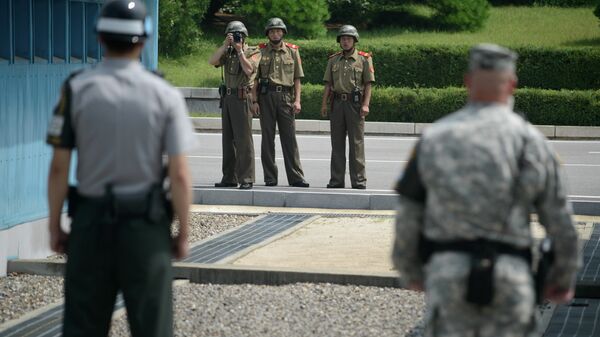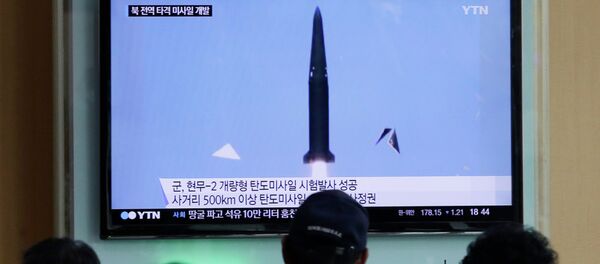TOKYO (Sputnik) – Russia is calling on North Korea and its adversaries to abstain from steps that could trigger the escalation of tensions in the region, Russian Ambassador to the Democratic People's Republic of Korea (DPRK) Alexander Matsegora told RIA Novosti.
"We think that both the DPRK and its opponents should abstain from steps that could trigger an escalation of tensions and therefore worsening of the situation in the region," Matsegora said in a written interview.
The situation on the Korean Peninsula is tense at the moment, Matsegora said.
"We see it as both sides’ fault," he added.
North and South Korea remain in a formal state of war, as no peace treaty was signed after the Korean War of 1950-1953.
North Korea’s relations with the West have been strained for many years.
Despite participating in denuclearization talks with the United States, Russia, China, Japan and South Korea, North Korea has carried out three nuclear tests since 2006. The United Nations and the United States imposed several rounds of sanctions against Pyongyang, condemning its nuclear activity.
Washington has also repeatedly accused Pyongyang of human rights violations, cyberattacks and military action.
The United States is known to conduct annual military exercises with South Korea on the Korean Peninsula, which Pyongyang has termed a provocation.
North Korea should strictly observe the resolutions adopted by the UN Security Council on the development of its nuclear program Alexander Matsegora said.
"With Regard to North Korea, it means the strict implementation of the UN Security Council resolutions supported by Russia concerning the DPRK’s nuclear program," Matsegora said in a written interview.
In 2003, North Korea joined talks on denuclearization with the United States, Russia, China, Japan and South Korea, after Pyongyang withdrew from the Nuclear Non-Proliferation Treaty that it ratified in 1985.
Pyongyang declared itself to be a nuclear power in 2005, and tested its first nuclear weapon the following year.
The six-party denuclearization talks came to a halt in 2009, when Pyongyang tested its second nuclear weapon, and have been stalled ever since. North Korea carried out its last nuclear test in 2013.
The country’s nuclear tests have received international condemnation, and the United States and the United Nations imposed several rounds of sanctions against it.
Ivan Melnikov, the first deputy speaker of Russia's lower house of parliament, on Tuesday said that Puongyang would halt its nuclear program if the United States suspended its military exercises near North Korea's borders.
US military activities on the Korean Peninsula exceed the level of potential threats from the Democratic People's Republic of Korea, Russian Ambassador said.
"The growing number of US-South Korean military exercises, and in general US military activities on the Korean Peninsula and vicinity, obviously worsen the situation and considerably exceed not only the existing, but also the future potential of threats that may arise from Pyongyang," Matsegora said in a written interview.
The United States and South Korea have staged joint annual military drills as a message to North Korea, which it denounces as provocations. North and South Korea are formally in a state of war since the 1950-1953 Korean War ended in a stalemate.
Seoul's close military ties to Washington, with some 28,500 US personnel stationed on the Korean Peninsula, are viewed in Pyongyang with extreme suspicion.
The United States and South Korea have signed three arms deals so far this year worth in excess of $2 billion, involving the sale of Aegis ballistic missile defense systems, Stinger missiles, air-to-air launchers for Apache helicopters and other military equipment.
Earlier this month, the South Korean military reportedly successfully tested a ballistic missile capable of reaching any point in North Korea.
In 2009, Pyongyang declared that it had developed its first nuclear weapon. It regularly test-fires missiles as a response to the annual US-South Korean drills.



